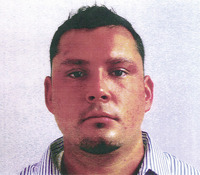Michigan state department urges hepatitis C tests during investigation of New Hampshire hospital worker
As the Michigan Department of Community Health continues to investigate the employment record of a New Hampshire man arrested and charged in July with infecting patients with hepatitis C, officials are encouraging individuals who may be at a heightened risk for the virus to be tested.
“We’re advising patients do what they can to protect their health,” said Angela Minicuci, spokeswoman for the MDCH. “Anyone who was at the hospital during the dates he was there should get tested.”
MDCH announced this week that David Kwiatkowski, 33, formerly of Canton, had worked at six different Michigan hospitals between 2003 and 2007.

David Kwiatkowski
AP Photo/U.S. Attorney's Office
He was a full-time employee at UMHS as a interventional radiologic technologist in the Department of Radiology, said Michael Steigmeyer, UMHS media relations employee.
UMHS declined to comment as to why Kwiatkowski left the hospital. AnnArbor.com has submitted a Freedom of Information Act request for Kwiatkowski’s personnel file.
In New Hampshire, Kwiatkowski is charged with causing a hepatitis C outbreak involving at least 30 patients who were treated at Exeter Hospital's cardiac catheterization lab. Officials said he also had worked at hospitals across the country, including facilities in Arizona, Georgia, Maryland, New York and Pennsylvania.
A nationwide investigation into Kwiatkowski’s employment record began after his arrest on July 19 in Massachusetts.
Even though while working some of the hospitals in Michigan — including UMHS — Kwiatkowski was not responsible for injecting patients with narcotics as a part of his job, Minicuci said the details the investigation has turned up thus far warrant the measure.
“Based on evidence we’ve seen from other states, we’re doing this out of precaution,” she said. “This is something that’s a unique situation.”
The investigation revealed Kwiatkowski has been infected with hepatitis C since at least June 2010.
Hepatitis C is a bloodborne viral infection that can cause inflammation of the liver and may lead to chronic health issues. It can be detected by blood tests and treated with antiviral medications.
The investigation is ongoing into the medical facilities in Michigan where Kwiatkowski was employed. The hospitals have set up hotlines for patients to call to find out if they need to be tested for hepatitis C.
- Sinai Grace Hospital in Detroit from June to October 2005; 1-888-300-3627
- Harper Hospital in Detroit from October 2005 to September 2006; 1-888-300-3627
- University of Michigan Health System in Ann Arbor from Sept. 11 to Dec. 8, 2006; 1-877-233-4040
- Oakwood Annapolis Hospital in Wayne from Jan. 15 to Sept.15, 2007; 1-734-467-4111
Individuals do not have to be tested for hepatitis C at the same hospital where they initially received treatment, Minicuci said.
Injectable narcotics topically are pain medications used in an array of procedures across a hospital, Minicuci said.
Amy Biolchini covers Washtenaw County, health and environmental issues for AnnArbor.com. Reach her at (734) 623-2552, amybiolchini@annarbor.com or on Twitter.


Comments
Rudra N Rebbapragada
Sat, Aug 4, 2012 : 3:27 p.m.
Investigation of Infectious Diseases : The Department of Public Health may have to investigate the history of the transmission of this infectious agent apart from investigating the employment history of this individual who is suspected to be the source of infection. Typically, the investigation of Infectious Disease must include the mode of transmission, the place of transmission, and the mechanism of transmission. To prove that an infected needle is the cause of transmission, we have to inspect the instruments that are used at the place of transmission. We have to establish the fact that the place has proper standards to ensure the safety of the instruments. Syringes that are autoclaved are kept sealed and are opened just prior to their use. We have to conclusively find evidence that the place has proper standards for using sterile instruments.